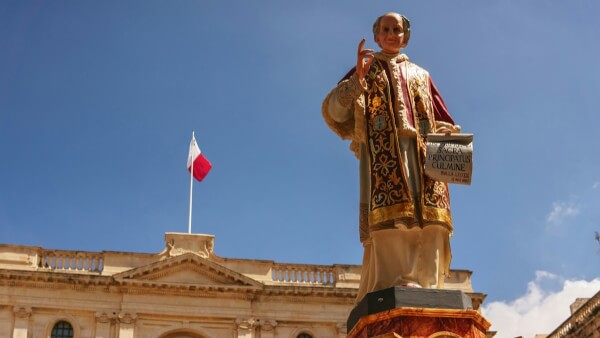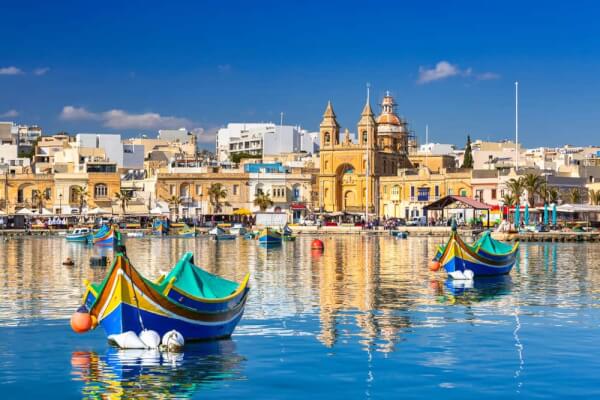How Malta citizenship by investment works
Thinking of applying for a Maltese passport? Read our guide on the Malta citizenship by investment programme, including the requirements, costs and benefits.

Are you set to receive an inheritance from a relative living in Malta? Or perhaps you’ve retired to Malta as a UK expat, and plan to see out your days there.
In both of these circumstances, it’s useful to know a little about how inheritance law works in Malta - especially in relation to taxes.
In this guide, we’ll be covering all the essentials you need to know about inheritance tax in Malta. This includes rates, allowances, exemptions and how inheritance-related tax is calculated in the country - and how to pay any tax you may owe.
We’ll also show you how to send large amounts of money securely between countries using the Wise Account. This can be extremely useful if you have inheritance tax to pay, or want to send money from an inheritance back to the UK.
| Table of contents |
|---|
Inheritance tax, known as IHT in the UK, is a tax paid to the government on the estate of someone who has died. The ‘estate’ usually encompasses all property and possessions, as well as savings, investments and pensions.
Many countries have inheritance tax systems. Depending where in the world you are, the tax may be known as estate tax, inheritance tax or succession tax.
However, not all countries have this kind of tax in place. New Zealand, Singapore, Portugal and Canada are among a handful of countries which don’t charge inheritance tax at all.¹
Malta doesn’t have inheritance tax, estate tax or death duties. However, there is still what is known as Capital Transfer Duty (also known as stamp duty) to pay when certain assets and property are transferred as part of an inheritance.²
It only applies to real estate, property and other assets held in Malta, rather than in other countries.
The law and processes relating to inheritances is overseen by the Tax and Customs Authority Malta and applies to the whole country, with no regional variations.
Under Maltese inheritance tax laws, the estate of the deceased person is dealt with and taxed in the country they are permanently resident in.
So if you have a relative who permanently lives in Malta and you receive an inheritance from them, you may be subject to Maltese inheritance laws - even if you live in the UK or another country.
A crucial point to remember though is that only assets held in Malta are subject to the country’s Capital Transfer Duty.²
Anyone who is liable for the duty will need to pay it separately to the tax authority. This is different to how it works in the UK, where a lump sum of tax is paid out of the estate.
It’s important to get professional tax advice to check which country’s tax laws apply to you, especially if you live between countries or have property in multiple countries.
As Malta charges stamp duty rather than inheritance tax, its rates are a little different to other countries.
In the UK, there’s a flat rate applied to estates valued over a certain sum.
Elsewhere in Europe, countries such as Spain, Italy and France use progressive tax systems where the rate falls into set categories depending on the value of the inheritance and/or the relationship of the beneficiary to the deceased person.
These countries also offer a tax-free personal allowance to each beneficiary based on how close a relative they are to the deceased.
But in Malta, there’s just one rate of Capital Transfer Duty to know about - a flat rate of 5%.³ This applies to all beneficiaries who are eligible to pay the tax, although there are some exemptions and rebates - we’ll look at these next.
Under Maltese inheritance laws, all ‘immovable’ property situated in Malta is subject to Capital Transfer Duty when transferred as part of an inheritance.
However, there are some exemptions and allowances, such as:²
In order to calculate the amount of Capital Transfer Duty owed by recipients of Maltese property as part of an inheritance, the tax authority in Malta must determine the value of the assets - for example, the value of a real estate property.
To do this, the authority’s assessor will provide a value for each asset. This will be checked by an internal board and if required, an additional valuation from a third-party specialist will be sought.⁴ This is the value that will be used to calculate the 5% stamp duty owed.
If you are a beneficiary who is liable for stamp duty, there is a set process you must follow.
The first step is to go to a Notary Public to have a ‘Causa Mortis’ declaration (known as denunzja in Maltese) drawn up. On signing this declaration, you must pay the amount of Capital Transfer Duty due. The Notary then registers the declaration and transfers the duty paid to the tax authorities.⁵
There are penalties to pay if you don’t submit your Causa Mortis declaration and pay the required transfer duties on time. If you fail to make the declaration within a year of the person’s death, you'll have to pay interest at a rate of 4% per year. You may also miss out on any exemptions you may have been eligible for. ⁶
You’ll need to contact the tax authority to find out about available payment methods.
If you’re living in the UK or another country, a solution such as Wise could be ideal for sending a payment for inheritance tax to Malta. You can send money worldwide with Wise, for low fees* and mid-market exchange rates. There’s even a dedicated service for securely sending large amounts.
After reading this, you should have a better idea of how the Maltese inheritance tax system works - or rather, how the country’s transfer taxes apply to inherited assets in the country. We’ve looked at rates, exemptions and how to pay inheritance-related tax in Malta.
If you need a way to pay taxes abroad, send inherited money back to the UK or generally manage your finances between countries - Wise is a great solution.
With Wise, you can hold and convert between 40+ currencies in your online account. And you can send money worldwide for low, transparent fees* and mid-market exchange rates.
If you’re sending a large sum between countries, read our quick guide on what documents you’ll need.
Whether you’re paying foreign bills or trying to get the best exchange rates when repatriating funds from overseas back to the UK, your Wise account can do it all.
Here are some commonly asked questions:
It all depends on your relationship to the person who has died. If you’re a close relative such as a spouse or child, you shouldn’t have to pay the stamp duty tax that Malta uses instead of inheritance tax.
No, Malta isn’t officially classed as a tax haven, like some European countries like Monaco, Luxembourg and Switzerland.
Recognised tax havens often have very low or no corporate tax, while Malta charges a respectable rate of 35%. However, Malta is often mentioned in the same breath as other tax havens due to its tax refund system for companies, which can reduce the amount of tax owed.⁷
And of course, there’s also the fact that Malta doesn’t charge any inheritance tax - although it does have a transfer tax on inherited assets.
The country is also transparent on tax (unlike some known tax havens) and adheres to all EU regulations.⁷
Malta uses a system called forced heirship to determine how inheritances are divided. This is part of the country’s Civil Code.
This is where close relatives (the spouse and any children) of the deceased are considered to have a right to inherit a share of their estate, despite what might be in the person’s will.⁸
If there’s no will or the will is ruled invalid, estates are divided in line with the country’s succession laws.
Within the EU, the following countries have no inheritance taxes:⁹
Sources used:
Sources last checked on date: 28-Jul-2025
*Please see terms of use and product availability for your region or visit Wise fees and pricing for the most up to date pricing and fee information.
This publication is provided for general information purposes and does not constitute legal, tax or other professional advice from Wise Payments Limited or its subsidiaries and its affiliates, and it is not intended as a substitute for obtaining advice from a financial advisor or any other professional.
We make no representations, warranties or guarantees, whether expressed or implied, that the content in the publication is accurate, complete or up to date.

Thinking of applying for a Maltese passport? Read our guide on the Malta citizenship by investment programme, including the requirements, costs and benefits.

A list of the top banks in Malta, including Bank of Valletta, HSBC, APS Bank, FIMBank, MeDirect Bank and Lombard Bank Malta.

Everything you need to know about moving to Malta from the UK. Read about visas, popular expat destinations, healthcare and more.

How to buy property in Malta as a foreigner, including house prices, getting a mortgage and tips for finding your dream home.

Cost of living in Malta varies from region to region. This guide outlines what you can expect in terms of living costs.

Check out our essential guide on how to open a bank account in Malta as a British expat, including documents, fees, banks and much more.